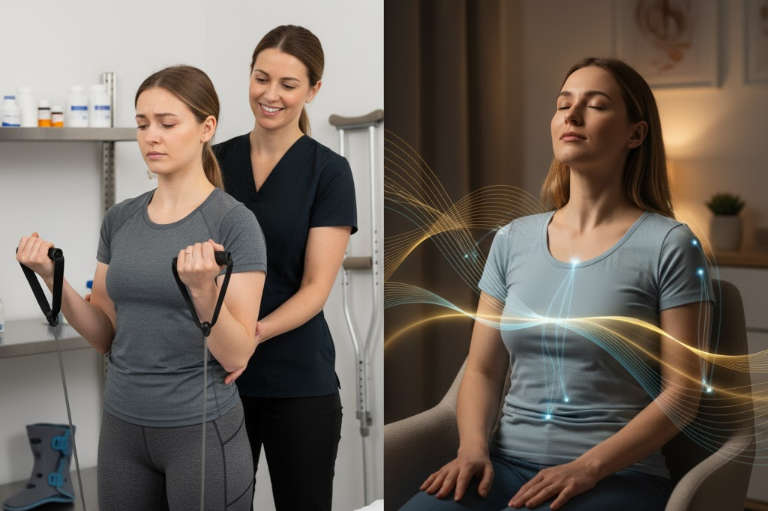On this page
Treating Ehlers-Danlos Syndrome
A Hypnotherapy Perspective
What if the way your body experiences Ehlers-Danlos Syndrome could shift, even slightly, with the help of your mind?
There is no known cure for Ehlers-Danlos syndrome (EDS). That’s the current medical position, and we respect it. EDS is a complex, inherited condition that affects connective tissue throughout the body. Treatments focus on managing symptoms, reducing complications, and supporting physical function. But often, people with EDS are told the same discouraging line: “There’s nothing you can do, just manage it.”

At SICH, we agree there is no known cure. But we also believe that doesn’t mean there’s nothing more to explore.
We’re interested in treating Ehlers-Danlos syndrome not just by helping with symptoms, but by working at a deeper level, through the subconscious mind, the nervous system, and the body’s own inner intelligence.
Hypnotherapy isn’t about replacing medical care, but it might offer something more than coping. It might be a way to work with the condition from the inside out.
What Is Ehlers-Danlos Syndrome?
Ehlers-Danlos syndrome (EDS) is a group of genetic conditions that affect the body’s connective tissues, the collagen and related proteins that provide strength and elasticity to skin, joints, blood vessels, and internal organs.
People with EDS may experience a wide range of symptoms depending on the type, but common challenges include:
- Joint hypermobility, leading to frequent dislocations, pain, or instability
- Chronic pain in muscles and joints
- Digestive issues, such as bloating, reflux, or nausea
- Fatigue that does not always improve with rest
- Skin that bruises easily, heals slowly, or feels unusually soft
- Autonomic nervous system issues, like dizziness, heart rate fluctuations, or temperature regulation difficulties
Some people also experience anxiety, trauma, or emotional overwhelm, often as a result of years of being dismissed, misdiagnosed, or struggling to get the support they need.
Understanding EDS Beyond the Physical
Treating Ehlers-Danlos syndrome is more than a physical challenge. People with EDS often live with daily pain, fatigue, anxiety, digestive issues, poor sleep, and a body that can feel unreliable or fragile. They may also experience medical gaslighting, emotional exhaustion, or trauma from years of being misunderstood.
While physical therapies and bracing provide external support, what supports the inner world? This is where hypnotherapy offers a different lens.
We work with the lived experience of EDS, the emotional toll, the nervous system dysregulation, the way the brain interprets body signals, and the subconscious beliefs that shape how people relate to their condition. Treating EDS this way doesn’t require denying the genetic facts. Instead, it adds a new layer of possibility.
How Hypnotherapy Supports People with EDS Today
We already work with many clients who are living with Ehlers-Danlos Syndrome. Some come for pain relief, others for help with sleep or anxiety. Some want to feel more in control of their emotions, or more at peace with their body. Many feel stuck between managing their symptoms and feeling like they’re losing themselves in the process.
- Chronic Pain Management – Suggestion and imagery help reframe how pain is processed in the brain, reducing the emotional and sensory impact of ongoing discomfort.
- Sleep Support – Hypnotherapy can create deeper relaxation before bed and calm a restless mind or body, helping people with EDS rest more fully.
- Digestive Regulation – Many with EDS experience IBS, gastroparesis, or food-related anxiety. Gut-directed hypnotherapy is an established method for supporting digestive symptoms.
- Nervous System Regulation – Hypnotherapy encourages parasympathetic activation, helping to rebalance heart rate, digestion, and energy.
- Emotional Resilience – Hypnotherapy supports self-worth, confidence, and body acceptance, especially after medical trauma or chronic invalidation.
- Energy Conservation – Techniques can help reduce stress-related energy drain and reinforce internal pacing strategies.
- Body Trust and Relationship – Many people with EDS feel disconnected from their bodies. Hypnotherapy rebuilds that connection, offering a gentler internal relationship.
We don’t treat Ehlers-Danlos syndrome as something to fix, but as something we can respond to in a more empowered, regulated, and compassionate way.
Respecting the Medical Model — and Asking More
The current medical model for treating Ehlers-Danlos syndrome focuses on:
- Physiotherapy and occupational therapy
- Pain relief and medication
- Pacing, bracing, and mobility aids
- Surgery for severe joint instability
- Psychological support (when available)
These are all valid and important. But we believe in asking what else is possible.

Could hypnotherapy reduce the burden of symptoms, not just manage them? Could the mind play a role in calming the immune system, softening pain signals, or shifting the emotional state that contributes to flare-ups?
Treating EDS may mean looking beyond structural issues to the dynamic, biopsychosocial landscape, where belief, emotion, trauma, and regulation meet the body. That’s where we work.
Frequently Asked Questions about treating Ehlers-Danlos syndrome
While hypnotherapy does not cure EDS, it may support your body and mind in managing the condition more effectively. By working with pain perception, nervous system regulation, and subconscious beliefs, hypnotherapy offers a gentle way of treating Ehlers-Danlos syndrome from the inside out.
Yes. Hypnotherapy is a non-invasive, relaxing approach that can be tailored to your needs. We work respectfully within the limits of your body and focus on creating internal safety, emotional stability, and nervous system calm — key aspects in treating EDS holistically.
Hypnotherapy can assist with chronic pain, poor sleep, anxiety, fatigue, digestive discomfort, and dysautonomia symptoms. It may also help rebuild body trust and shift the emotional weight of living with EDS. These areas are often overlooked when treating Ehlers-Danlos syndrome in traditional models.
Not at all. Our approach complements medical treatment. We fully respect the current medical model, including physiotherapy, medication, and bracing. Hypnotherapy is not a replacement, but an additional way to support your well-being while treating Ehlers-Danlos syndrome.
We go beyond symptom management by exploring subconscious patterns, emotional trauma, nervous system dysregulation, and body image. Treating EDS isn’t just about joints and tissues — it’s about how you live in your body, and how that relationship can change.
No. Many clients new to hypnotherapy find it easy to engage with, especially when it’s explained clearly and grounded in your personal experience. We’ll guide you gently through every step.
Why We Think It’s Time to Explore More
We’re not saying we can cure EDS. There is no known cure, and we won’t pretend otherwise. But we do believe it’s possible to shift how the condition is lived, and that hypnotherapy might be able to contribute more than previously thought.
People with Ehlers-Danlos syndrome often carry a hidden weight: not just the symptoms, but the messages they’ve absorbed. That they’re broken. That their body can’t be trusted. That nothing will help. That the future holds only more of the same.
We believe that kind of programming is harmful. And we believe the subconscious mind can change it.
Treating Ehlers-Danlos syndrome this way means opening new pathways, not just physical, but emotional, neurological, and relational. Hypnotherapy gives us tools to begin that process gently, respectfully, and with curiosity.
Looking Ahead: Can We Push the Boundary?
We’re now inviting people with EDS to help us take this exploration further. What if treating Ehlers-Danlos syndrome with hypnotherapy could do more than symptom relief? Could it influence the very way the body and brain relate to each other?
We’re launching a pilot study to explore exactly that.
This is not a treatment programme, it’s an information-gathering phase. We’re listening to people with EDS to learn what they need, how they experience their bodies, and where they see potential for change. From there, we’ll co-create a structured protocol that might push the boundary of what hypnotherapy can offer.
Join in our EDS pilot study